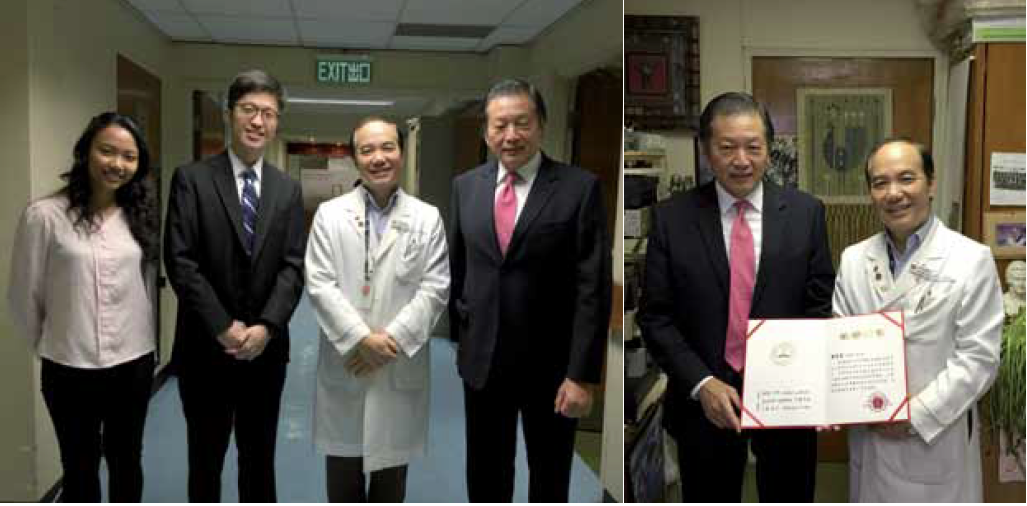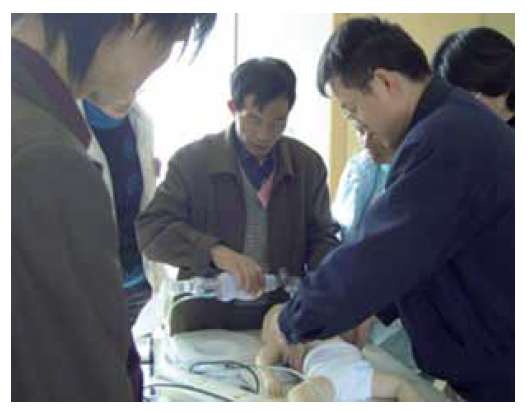© Hong Kong Academy of Medicine. CC BY-NC-ND 4.0
DOCTOR FOR SOCIETY
Re-making the system: founding an inspirational
model for humanitarian aid. An interview with Drs Vincent Leung and KL Cheung
Philip Ko, Khin-Shwe Eu
Year 4, Faculty of Medicine, The University of Hong Kong
As the great Pliny the Elder once said, “Fortune favors
the bold.” Cocooned in our comfortable bubble that
is Hong Kong, it is easy to forget that many are not so
lucky, mired in poverty, and deprived of the chance
to live healthy, fruitful lives. Many of the children in
the poverty-stricken areas of the world are at a severe
disadvantage the moment they are born, denied the
medical care they need to grow and thrive.
In a similar vein, it is sometimes easy to forget
that despite the significant advances China has made
over the past three decades, the growth has been
uneven, with some regions remaining underdeveloped
and yielding largely agrarian economies. In particular,
Yunnan province has remained one of the poorest
regions, with weak infrastructure and virtually non-existent
health care, especially in the remote hilly
areas occupied by ethnic minorities.
In 2006, Dr Vincent Leung and Dr Kam-lau
Cheung, well-respected paediatricians, decided
to form a joint venture, working towards building
a solid health care foundation for the paediatric
population of Yunnan. They are no strangers to
giving humanitarian aid, having already participated
in numerous humanitarian missions abroad, such
as Cambodia. This time, they envisioned something
different, a grand plan that would contribute to
decreasing the infant mortality rate by over 30% in
the next 4 years.
On their first visit to Yunnan, the two
paediatricians and their respective teams
carefully assessed the paediatric care needs in this
impoverished area of the country. Truth be told,
in the beginning, there was not much to assess. In
contrast to the medical system in Hong Kong and in
most other developed areas of the world, the state
of China’s medical system is not far from that of a
living fossil, with severely underpaid physicians who
are largely concentrated only in the urban areas.
In fact, most of the ‘physicians’ remaining in rural
Yunnan are not true physicians from universities, but
rather vocation-trained ‘barefoot doctors’ with basic
training.
Upon inspecting the paediatric wards in a
rural health clinic, the first thing they noticed was a
complete lack of medical supplies: even the beds had
no mattresses. Patients would simply be examined on
what appeared to be a wire net with four legs. Drs
Leung and Cheung knew that this would be an uphill
battle, but did not realise that they would essentially
be starting from ground up.
Undeterred by the challenges ahead, they
returned home to formulate a local neonatal
resuscitation programme (NRP): rather than
simply giving these folks a handout like in some
humanitarian missions, they wished to distil key
knowledge and experience in newborn resuscitation
by taking classic NRP powerpoint and multiple
choice questions and translating them into simplified
Chinese. Armed with hundreds of copies, together
with essential training mannequins and other
equipment, they invited local health care providers
to a hotel in Xundan, Yunnan, to take a 2-day NRP
course, conducted in Putonghua. The first NRP
course in 2006 was welcomed with open arms by
the local health ministry. Collaborating with the
Kunming City Maternal and Child Health Centre and
the Hong Kong College of Paediatricians Foundation,
the two physicians organised annual NRP courses for
more than 100 local paediatricians and obstetricians,
as recommended by their respective hospitals. The
joint teaching programme involved more than 20
experienced paediatricians and nurses from Hong
Kong to teach hand-in-hand with local teachers.
Every successful participant was awarded a medical
kit filled with resuscitation equipment that included
resuscitators, laryngeal mask airways, endotracheal
tubes, meconium aspirators, and suction catheters to
equip them properly upon returning to their health
institution. The NRP is currently supported by over
20 Fellows of their College, and it has since evolved
into an annual programme. In numerous provinces
throughout China, they have set up NRP training
centres to ensure continued success—whilst the
Foundation continues to give support through the
provision of equipment such as resuscitators and
subsidies.
Of course, starting any venture, philanthropic
or otherwise, requires significant capital. Through
their networking and leadership skills, they managed
to raise a significant sum from colleagues and private
donors, kickstarting the first phase of the project.
Unlike many other international humanitarian aid
services, they wished to produce something more
self-sustainable and long-lasting. It is this major
focus on teaching neonatal resuscitation to health
care workers that has made all the difference: this has
ensured that babies are given all the necessary care
during the most vulnerable moments of childbirth.
Throughout this process of knowledge transfer, the
Chinese doctors were carefully assessed, nurtured,
and encouraged to be trainers, hence helping to pass
on the essential knowledge and skills in NRP. This has
exponentially magnified the educational effect, and
effectively cut down the mortality and morbidity of
birth asphyxia in the neediest areas of China.
In addition to organising fundraisers, Drs
Leung and Cheung also carefully navigated the
complex bureaucratic process, and managed to
secure official support from all of the local health
ministries in Yunnan, Kweizhou, Guangxi, and
Sichuan. Throughout the years, they managed to
successfully establish local training centres, fully
equipped and expertly staffed, which has also helped
to raise the standard of child health in western China.
They are firm believers in the philosophy that rather
than giving fish already caught, one should instead
teach how to fish. Translating this philosophy into
practice, teaching NRP to local doctors has proven
to be the most effective means to raise the health care
standards by a significant margin. It is no accident
that the neonatal mortality rate of Yunnan dropped
by over 30% over 4 years, after the project was
launched in 2006. No doubt this is in large part due to
the fact that over 1000 Chinese doctors have received
hands-on training to date.
Perhaps it is this key aspect that differentiates
their humanitarian endeavour from all others: their
ability to coordinate with various levels of the Chinese
government, and the coordination among the various
levels of leadership has been unsurpassed, allowing
them to achieve a level of success not seen in other
humanitarian missions across the country. In 2014,
the leader of the Chinese Communist Party awarded
Dr Leung an extremely prestigious “Model Citizen”
award for his outstanding contributions, and for
spearheading the movement towards improving the
health care system in rural China.
On their most recent trip back to Yunnan,
Drs Leung and Cheung met one of the health care
workers who thanked them profusely for empowering
him with knowledge and equipment: if not for this
generosity, countless lives would have been crushed,
and the children would never have had the chance
to grow and bloom. Knowing that they were able
to make such a huge difference is one of the major
reasons why the two physicians have gone beyond
their comfort zone to help the needy.
As for their future plans, Drs Cheung and
Leung emphasised their commitment to sacrifice
time every year to various other humanitarian
missions, and hopefully replicate the system that has
been so successful in Yunnan. “Anything is possible,”
they say, “Perhaps we will even turn this into a
global endeavour beyond Asia in the years to come,
replicating this very successful humanitarian aid
model to other impoverished nations.”
Our lives are a lump sum of all our choices. We
can take the easy route, huddling in the safety of our
homes, and living the model life, oblivious to all of
the suffering around us. Or we can take the red pill,
and know that we have done all we can to ease the
suffering of the world, bit by bit.
To those physicians in Hong Kong wishing to
go above and beyond in helping others, but are still
cautious of stepping outside the comforts of home,
Drs Cheung and Leung impart to them this pearl of
wisdom, “Only by stepping out of your comfort zone
will you empower yourself: by helping those who are
most in need, you will transform the way you view
the world, and give your own life an entirely new
meaning.”

(left) Student reporters and Dr Vincent Leung (far right) and Dr KL Cheung (second from right) at Prince of Wales Hospital in Shatin (right) Major award by the Chinese Communist Party for their sacrifices and humanitarian contributions


